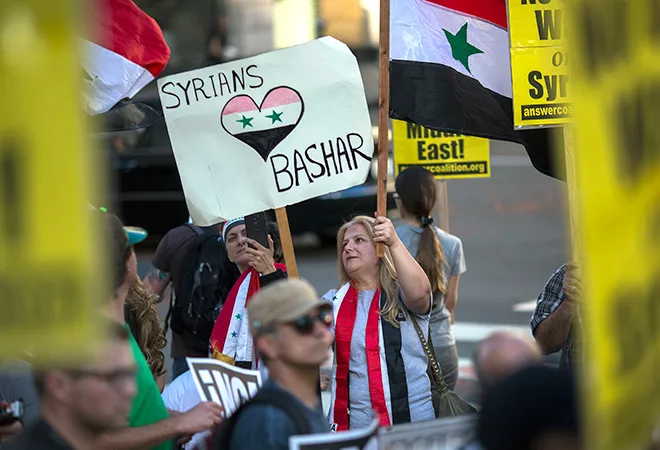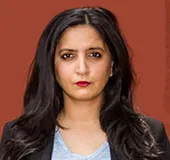-
CENTRES
Progammes & Centres
Location

Image Source: Getty Images/David McNew
Supporters of Syrian President Bashar al-Assad protest the US-led coalition attack in Syria
Arab nations have begun making overtures towards Syria to readmit it in the Arab fold. In 2011, the 22-member Arab League had suspended the membership of Syria, accusing its government of crushing protests.
As President Bashar al-Assad wins the war, Arab countries, at least those in the Saudi bloc, are initiating a plan B to have a say in Syria’s future and to be able to contain regional rival Iran.
Mid-December last year, Sudan’s President Omar al-Bashir, who is close to the Saudis, became the first leader since the war to meet Assad. Upon his return to Khartoum, he met a top military delegation from Riyadh. Soon after, two of Saudi’s closest allies -- the United Arab Emirates and Bahrain -- reopened their embassies in Damascus.
The meetings and the decisions which followed are being interpreted as indicators of a change in the Saudi policy on Syria. The Saudi Crown Prince Mohammad Bin Salman or MBS, as he is referred to in the region, is carefully but clearly opening up to Assad.
Even Assad’s friends in the region, such as men close to Hizbollah and the Syrian intelligence elite, some of whom I have spoken to, share the view.
The Saudis funded several rebel groups who fought Assad in the eight-year-long civil war. They are no longer in control of Syrian territory. These proxy groups have been rendered useless as they are now huddled in Idlib in northern Syria and are in position to look out for Saudi interests.
In a bid to have its say, Saudi allies are renewing not just diplomatic but also commercial ties. Media reports say that Fly Dubai is mulling restarting its operations in Damascus and the business may soon be done with Syria through a transport corridor from the Jebel Ali port in Dubai to the Naseeb-Jaber border crossing between Jordan and Syria.
The volte-face by the Gulf nations led to rumours that Riyadh itself may reopen the Saudi embassy in Damascus. Riyadh denied the rumours, but that denial came after US’s Secretary of State Mike Pompeo went on a whirlwind tour to Arab nations.
America’s main interest in Syria too is to halt Iran, which aspires to have a direct road bridge from Tehran through Syria and Iraq to Lebanon. The presence of American troops has thus far hindered Iranian ambitions to some extent. But as American troops begin the process of leaving, Saudis are worried that there is nothing stopping Iran from expanding.
Pompeo’s message that America is leaving, but not soon and will continue to weaken Iran, may have put a break on the Saudi bloc’s outreach to Syria temporarily, but knowing that the exit of the American troops, sooner or later, is imminent, the Saudis seem to be preparing for when America is gone.
The chatter over Syria’s reinstatement in the Arab League has hence picked up.
The day after Christmas last year, British newspaper The Guardian reported that by March, when the Arab League meets in Tunisia, Syria is likely to be readmitted.
The Arab League’s Social and Economic Summit, held on 19-20 January in Beirut, Lebanon -- a prelude to the meeting in March -- was dominated by the talk of Syria’s reinclusion.
Although there was no consensus, Assad’s allies of Hizbollah and political parties backed by them managed to create enough noise around reinstating Syria.
Currently, the Arab world is led by two different blocs engaged in a sub-regional war which may further help Assad. Saudi Arabia, the UAE, Egypt and Bahrain imposed a blockade on Qatar a year and a half ago mainly because Qatar has been sheltering the political Islamists of the Muslim Brotherhood. Qatar is a strong ally of Turkey whose President, Recep Tayyip Erdoğan, is a bigger patron of the group.
As the Syrian theatre stands now, the Saudi bloc would prefer Assad over Turkey backed groups to be stronger in Syria. The Brotherhood is arguably considered a bigger and more immediate threat by the monarchs and autocrats than even the Shiite Iran. MBS and Assad may well see a common cause in taking on the Muslim Brotherhood. However, for the Saudis, the obstacle in moving forward on this path is that Assad, who is supported by the Iranian militias in the war, may not concede much to them on Iran.
Qatar has no national interests in Syria. It did fund Islamist rebel groups against Assad, but they have met the same fate as those propelled by Saudi Arabia. Now it rules out Syria’s return to the Arab League. Qatar’s Foreign Minister Sheikh Mohammed bin Abdulrahman Al Thani has said that they do not see any ‘encouraging’ factors to revoke Syria’s suspension.
Nonetheless, Qatar is unlikely to stand in Syria’s way if there is enough momentum to include it. Qatar is likely to follow Turkey and America’s plan for Syria. Turkey itself may go easier on Assad if Russia guarantees support on the Kurdish question. Turkey sees the Syrian Kurds as an arm of the secessionist Kurds in Turkey who have conducted several terror strikes within Turkey over the years. Turkey wants the Kurds out of the areas in their southern border and an assurance that they will not venture into Turkey to unleash terror. The negotiations on what that deal would look like are going on between Moscow and Ankara currently.
Assad is seeking to re-establish his authority over a broken country and is anxious to have the backing of the Arab world. Other than the legitimacy it provides to him, he is also looking for reconstruction funds to rebuild the country. According to estimates, Syria needs anywhere between 300$-400$ billion for reconstruction. However much Russia and Iran may have supported Assad militarily, their economies are simply not strong enough to foot the entire bill. Money from the wealthy Arab nations is a necessity.
To sum it up, in time, Syria’s acceptance in the Arab world is inevitable. The day Syria re-enters the Arab League, it would officially mark the end of the Arab spring; popular uprisings which began in 2010 seeking a change from the dictators to real democracy.
The views expressed above belong to the author(s). ORF research and analyses now available on Telegram! Click here to access our curated content — blogs, longforms and interviews.

Anchal Vohra was a Fellow at ORF. She writes on contemporary developments in West Asia and on foreign policy.
Read More +